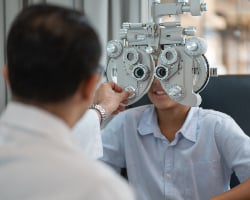At Infinite Eyecare, it’s important to us that all eyes remain happy and healthy. That’s why our comprehensive eye exams involve the most thorough testing and modern diagnostic techniques available.
A 2018 study from the Canadian Association of Optometrists found that the future of eye health and vision care in Canada is concerning: The prevalence of vision loss in Canada is expected to increase by nearly 30% in the next decade and that over 75% of vision loss is preventable or treatable.
Don’t wait, book an appointment with us today and give your eyes a clean bill of health.
Many eye diseases are asymptomatic, meaning they come on silently and will often not display symptoms until vision has already been affected. That’s why it’s vital to have your eyes checked regularly.
But what are we checking for? In addition to visual acuity and eye movement, we test eye health for signs of the following conditions:
AMD is a condition that damages the macula (the central portion of the retina).
The disease progresses slowly, often with no pain or warning symptoms, causing the central vision to deteriorate. Without treatment, central vision can be completely lost. Related to aging eyes.
The most common type of AMD, dry macular degeneration, occurs when drusen (small lipid deposits) accumulate, damaging the light-sensitive cells in the retina.
Wet macular degeneration is less common, but can progress very rapidly. It occurs when abnormal blood vessels behind the retina start to grow under the macula. These new blood vessels tend to be very fragile and often leak blood and fluid, damaging the light-sensitive retinal cells.
Cataracts are a natural part of the eye’s aging process and typically form around the age of 60. At this time, the eye lens becomes thicker, less flexible, and less transparent. Eventually, the tissues in the lens start to break down and clump together, creating cloudy areas and opaque spots. Luckily, cataracts can be removed with a simple surgery.
More commonly known as pink eye, conjunctivitis occurs when the conjunctiva (the thin, transparent membrane that covers the white of your eye) becomes irritated and inflamed, causing the blood vessels in the eye to dilate. The three most common types are:
Caused by a bacterial infection, bacterial conjunctivitis is highly contagious and must be treated with antibiotics.
Usually caused by a flu virus, this type of conjunctivitis has no treatment and must be allowed to run its course. Highly contagious, patients with viral conjunctivitis should avoid public areas until it’s cleared up.
Conjunctivitis caused by allergies is not contagious, and usually can be treated with antihistamines.
Glaucoma is categorized as damage to the optic nerve, the part of the visual system that carries information from the eyes to the brain. Considered a very serious eye disease, it doesn’t often present vision loss or other symptoms until it’s later stages.
Glaucoma is caused when an excess of fluid in the front area of the eye builds and can’t properly drain, due to high intraocular pressure (OCT). However, it can occur without OCT, a condition called normal-tension glaucoma. Whatever the cause, we use Goldmann applanation tonometry, which is considered to be the gold standard IOP test to detect this serious eye disease as soon as it forms.
Although having diabetes can increase your chances of developing many serious eye diseases and conditions, diabetic macular edema and diabetic retinopathy are two eye serious eye diseases directly linked to the disease. To help safeguard their vision, patients with diabetes should undergo annual eye exams.
Eye floaters are tiny pieces of protein that float in the vitreous fluid of our eye. As we age, this fluid becomes more viscous, allowing the floaters to flow more readily, making them more noticeable. While not generally something to worry about, if floaters are accompanied by flashes of light, it may be a sign that your retina has become detached or torn. Retinal tears are incredibly serious and can lead to vision loss if they aren’t treated quickly.

At Infinite Eye Care, we pride ourselves on conducting comprehensive eye exams to consider all aspects of your vision.

At Infinite Eyecare, it’s important to us that all eyes remain happy and healthy. That’s why our comprehensive eye exams are the best.

All eyes require comprehensive care, but diabetic eyes require special attention. Since diabetic eyes are more susceptible.

There are several reasons to opt for contact lenses as an alternative to glasses – including comfort, convenience, and lifestyle.
ExcellentBased on 127 reviews
 Akriti Bhardwaj2023-09-01Kudos to Dr.Jassar and all the staff members! The best place to get eye exam :)
Akriti Bhardwaj2023-09-01Kudos to Dr.Jassar and all the staff members! The best place to get eye exam :) Manbir chahal2023-08-19Best treatment provider by Dr. Jassar, Very satisfying.
Manbir chahal2023-08-19Best treatment provider by Dr. Jassar, Very satisfying. Marlene Alexander-Huxter2023-08-13I can’t say enough good about Dr.Jassar and staff . Anything they can do to help you , they are right there . I wish to thank them for another wonderful visit , at which time things were explained extremely well !
Marlene Alexander-Huxter2023-08-13I can’t say enough good about Dr.Jassar and staff . Anything they can do to help you , they are right there . I wish to thank them for another wonderful visit , at which time things were explained extremely well ! Jen Boland2023-08-12My four-year-old got in to see the optometrist with a referral the same day, answered all my questions and were very gentle, patient and kind with her.
Jen Boland2023-08-12My four-year-old got in to see the optometrist with a referral the same day, answered all my questions and were very gentle, patient and kind with her. Baldev Ghoman2023-08-05Everyone of the staff were very friendly and helpful also very informative to all of my questions about my eye checkup.
Baldev Ghoman2023-08-05Everyone of the staff were very friendly and helpful also very informative to all of my questions about my eye checkup. Victoire Yanse2023-07-27They give an amazing service!!! I’ve been at the infinity eye care three times and cannot complain. They’re taking their time to satisfy patients and show so much support towards them. They’re friendly which making customers feel comfortable. Also the music there is insane; it makes you not wanting to leave:) If you want my honest opinion, I would say don’t hesitate!!! You won’t regret❤️
Victoire Yanse2023-07-27They give an amazing service!!! I’ve been at the infinity eye care three times and cannot complain. They’re taking their time to satisfy patients and show so much support towards them. They’re friendly which making customers feel comfortable. Also the music there is insane; it makes you not wanting to leave:) If you want my honest opinion, I would say don’t hesitate!!! You won’t regret❤️
We will act quickly as possible!
© 2024 Infinite Eyecare, All Rights Reserved | Powered by: New Marketing Revolution Inc.